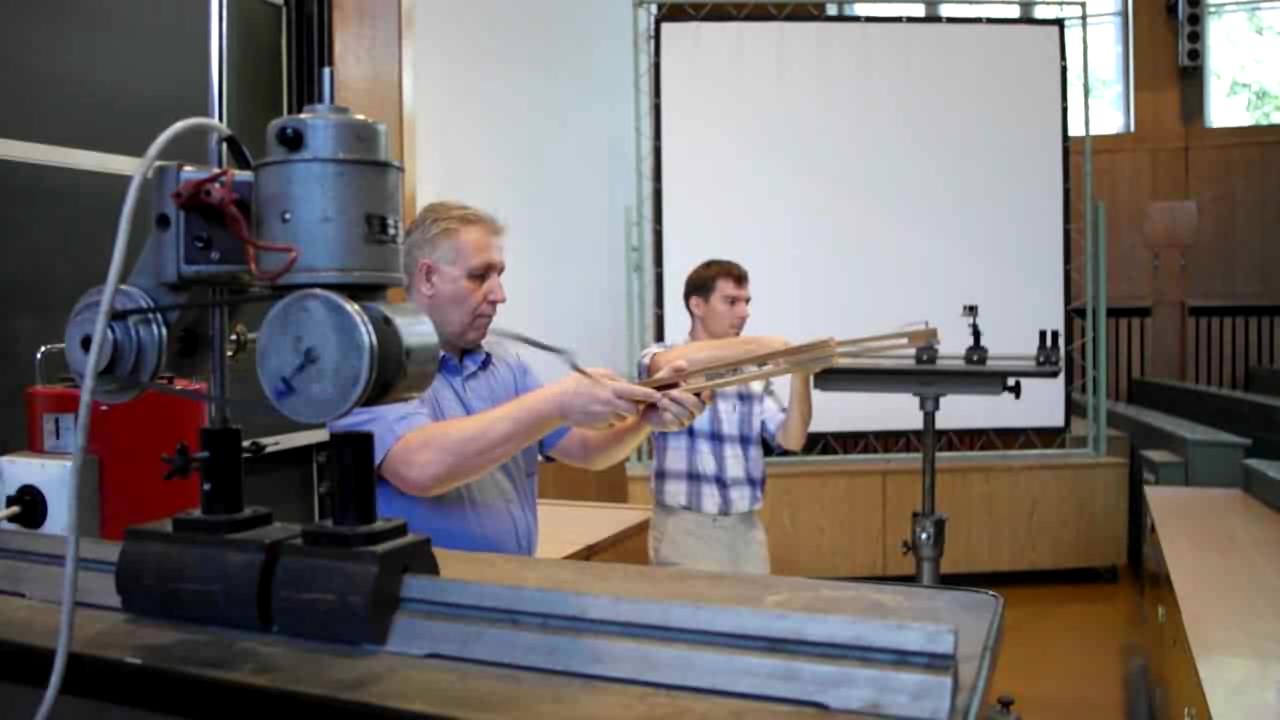„Hullámok polarizálása” változatai közötti eltérés
| (egy szerkesztő 2 közbeeső változata nincs mutatva) | |||
| 4. sor: | 4. sor: | ||
== Az elhangzó szöveg == | == Az elhangzó szöveg == | ||
| − | Egy a keresztirányú méreteihez képest hosszú csavarrugón egy körhagyó segítségével hozzunk létre állóhullámot. Ekkor a csavarrugó minden pontja körmozgást fog végezni. A hat félhullám harmadik csomópontjánál helyezzünk el fixen egy rést, amely éppen a rugóval megegyező szélességű. A vízszintesen tartott réstől jobbra eső tartományban megfigyelhetjük, hogy a rugó csak vízszintes síkban rezeg. Vagyis síkban poláros hullámot hoztunk létre. Két | + | Egy a keresztirányú méreteihez képest hosszú csavarrugón egy körhagyó segítségével hozzunk létre állóhullámot. Ekkor a csavarrugó minden pontja körmozgást fog végezni. A hat félhullám harmadik csomópontjánál helyezzünk el fixen egy rést, amely éppen a rugóval megegyező szélességű. A vízszintesen tartott réstől jobbra eső tartományban megfigyelhetjük, hogy a rugó csak vízszintes síkban rezeg. Vagyis síkban poláros hullámot hoztunk létre. Két csomóponttól jobbra is helyezzünk el egy vízszintesen tartott rést, egy második polarizátort. Majd az egyiket fordítsuk függőleges helyzetűre. Ekkor a második réstől jobbra eső tartomány nyugalomba kerül, sem függőleges sem vízszintes síkban nem rezeg a rugó. A keresztezett polarizátorokkal kioltottuk a hullámot a rugó ezen tartományában. |
| − | == | + | == Wave polarization == |
| − | + | We fix one end of a coil spring which is long in comparison to its diameter and create a standing wave with the help of a camshaft. Then every part of the spring will be in circular motion. Let us fix a slit of the same diameter as the spring at the third node of the six half waves. When the slit is in the horizontal position, we can see that the spring only oscillates in a horizontal plane, that is we have polarized the wave into a single plane. Let us place another horizontal slit, that is another polarizor, two nodes away. Then let us rotate on into a vertical position. Then to the right of the second slit, the oscillation will stop entirely, the spring will not oscillate in the vertical or horizontal plane. With the two perpendicular polarizors, we cancel the waves in the spring. | |
</wikitex> | </wikitex> | ||
A lap jelenlegi, 2014. március 9., 12:38-kori változata
Az elhangzó szöveg
Egy a keresztirányú méreteihez képest hosszú csavarrugón egy körhagyó segítségével hozzunk létre állóhullámot. Ekkor a csavarrugó minden pontja körmozgást fog végezni. A hat félhullám harmadik csomópontjánál helyezzünk el fixen egy rést, amely éppen a rugóval megegyező szélességű. A vízszintesen tartott réstől jobbra eső tartományban megfigyelhetjük, hogy a rugó csak vízszintes síkban rezeg. Vagyis síkban poláros hullámot hoztunk létre. Két csomóponttól jobbra is helyezzünk el egy vízszintesen tartott rést, egy második polarizátort. Majd az egyiket fordítsuk függőleges helyzetűre. Ekkor a második réstől jobbra eső tartomány nyugalomba kerül, sem függőleges sem vízszintes síkban nem rezeg a rugó. A keresztezett polarizátorokkal kioltottuk a hullámot a rugó ezen tartományában.
Wave polarization
We fix one end of a coil spring which is long in comparison to its diameter and create a standing wave with the help of a camshaft. Then every part of the spring will be in circular motion. Let us fix a slit of the same diameter as the spring at the third node of the six half waves. When the slit is in the horizontal position, we can see that the spring only oscillates in a horizontal plane, that is we have polarized the wave into a single plane. Let us place another horizontal slit, that is another polarizor, two nodes away. Then let us rotate on into a vertical position. Then to the right of the second slit, the oscillation will stop entirely, the spring will not oscillate in the vertical or horizontal plane. With the two perpendicular polarizors, we cancel the waves in the spring.
